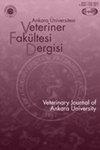黄连提取物的生物相容性及体内创面愈合效果研究
IF 0.9
4区 农林科学
Q3 VETERINARY SCIENCES
引用次数: 0
摘要
Cotinus coggyria普遍出名的是它的杀菌、消炎、抗菌,antihemorrhagic,愈合特性。在本研究中,我们旨在评估coggyria的酚类含量、细胞毒性/增殖、溶血、抗菌、基因毒性、凋亡、坏死活性和体内伤口愈合作用。TOF-LC/MS分析表明,黄酮和酚类化合物主要为没食子酸、儿茶素、原儿茶素酸、香草酸、鞣花酸、迷迭香酸、槲皮素、4-羟基苯甲酸、绿原酸、芦丁和芹菜素7-苷。水和甲醇提取物对L929成纤维细胞无细胞毒性和遗传毒性,凋亡和坏死作用可忽略。水提物无溶血作用。甲醇和水提取物对直径为9 mm和8 mm的大肠杆菌的抑菌活性最强。结果表明,与对照组相比,经草茎提取物处理的细胞中GAG的表达增加。免疫细胞化学染色检测ⅰ型胶原、ⅳ型胶原、纤维连接蛋白和弹性蛋白。在体内烧伤模型中,确定用叶茎提取物处理的创面愈合速度快于对照组。因此,体外和体内研究表明,coggyria具有抗菌作用,特别是对大肠杆菌,没有细胞毒性、基因毒性、溶血、凋亡和坏死活性,对伤口愈合有有效的作用本文章由计算机程序翻译,如有差异,请以英文原文为准。
Investigation of the biocompatibility and in vivo wound healing effect of Cotinus coggyria extracts
Cotinus coggyria is popularly known for its antiseptic, anti-inflammatory, antimicrobial, antihemorrhagic, and wound-healing properties. In this study, it was aimed to evaluate the phenolic contents, cytotoxicity/proliferation, hemolytic, antimicrobial, genotoxic, apoptotic, necrotic activities and in vivo wound healing effects of C.coggyria, a plant species known to have beneficial effects on wound healing. TOF-LC/MS analyzes revealed that the flavonoids and phenolic compounds in the methanol extract of C.coggyria leaves and stems were as follows: gallic acid, catechin, protocatechin acid, vanillic acid, ellagic acid, rosmarinic acid, quercetin, 4-hydroxybenzoic acid, chlorogenic acid, rutin and apigenin 7-glycoside. Water and methanol extracts from C.coggyria caused neither cytotoxicity nor genotoxicity in L929 fibroblasts with negligible apoptotic and necrotic effects. The water extract of C. coggyria had no hemolytic effect. The strongest antibacterial activity of methanol and water extracts was observed against E.coli with zone diameters of 9 mm and 8 mm, respectively. It was determined that the expression of GAG increased in the cells treated with C.coggyria stem extract compared to the control group. Collagen type I, type IV, fibronectin and elastin were detected in immunocytochemical staining. In the in vivo burn model, it was determined that the wounds treated with leaf and stem extracts healed faster than the control group. As a result, it has been seen that C.coggyria has antibacterial properties, especially against E.coli, without cytotoxic, genotoxic, hemolytic, apoptotic and necrotic activities, and C.coggyria is effective in wound healing by in vitro and in vivo studies
求助全文
通过发布文献求助,成功后即可免费获取论文全文。
去求助
来源期刊
CiteScore
1.50
自引率
0.00%
发文量
44
审稿时长
6-12 weeks
期刊介绍:
Ankara Üniversitesi Veteriner Fakültesi Dergisi is one of the journals’ of Ankara University, which is the first well-established university in the Republic of Turkey. Research articles, short communications, case reports, letter to editor and invited review articles are published on all aspects of veterinary medicine and animal science. The journal is published on a quarterly since 1954 and indexing in Science Citation Index-Expanded (SCI-Exp) since April 2007.

 求助内容:
求助内容: 应助结果提醒方式:
应助结果提醒方式:


